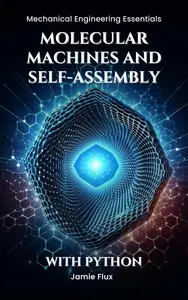
Free Download Molecular Machines and Self-Assembly (Mechanical Engineering Essentials with Python) by Jamie Flux
English | September 10, 2024 | ISBN: N/A | ASIN: B0DGQ7JT1J | 378 pages | PDF | 7.55 Mb
Dive into the revolutionary world of nanotechnology with this comprehensive guide designed for engineers, scientists, and enthusiasts. This book unravels the complexities of nanotechnology engineering by focusing on molecular machines and self-assembly, bringing key concepts to life with clear explanations and practical Python code. Unlock the potential of molecular dynamics, quantum simulations, and advanced computational models to propel your understanding of nanoscale systems to new heights.
Key Features:
– Comprehensive exploration of 66 cutting-edge topics in nanotechnology
– Practical Python code for every chapter to enhance learning and application
– Insightful discussions on theoretical frameworks and their real-world applications
– Step-by-step guides for simulating molecular interactions and designing nanomachines
– Multi-disciplinary approach bridging physics, chemistry, engineering, and computer science
What You Will Learn:
– The role of the Langevin and Fokker-Planck equations in molecular motion modeling
– Applications of stochastic differential equations to random perturbations in nanomachines
– How to use the master equation for predicting complex reaction behaviors
– Theoretical insights into Brownian ratchets and directional molecular motion
– Kinetic modeling of self-assembly processes with rate equations
– Implementing Monte Carlo and molecular dynamics simulations
– Transition state theory applications in reaction mechanisms analysis
– Energy landscape theory for understanding folding pathways and stability
– Thermodynamic integration techniques for free-energy calculations
– Utilizing path integral formulation for quantum properties analysis
– Quantum mechanical simulations and their impact on nanoscale operations
– Density Functional Theory for electronic property exploration
– Self-consistent field theory in modeling polymers within self-assembled systems
– Innovations in elastic network models for probing protein nanomachines
– Leveraging coarse-grained models to simplify molecular machine dynamics
– Developing force field parameters for fine-tuned molecular simulations
– Adaptive biasing force algorithm for energy landscape exploration
– Non-equilibrium molecular dynamics for off-balance process study
– Bridging nanoscales with meshfree and multi-scale modeling methods
– Reaction-diffusion models for pattern formation in nanostructures
– Exploring Hamiltonian and generalized Langevin dynamics in simulations
– Advanced kinetic Monte Carlo methods for temporal molecular behaviors
– Enhancing simulations with non-Boltzmann sampling algorithms
– Force-clamp dynamics for mechanotransduction insights
– Using the string method to identify transition states and energy paths
– Ab initio molecular dynamics for real-time electronic structure simulation
– Quantum/Classical hybrid methods for nanoscale systems requiring quantum accuracy
– Green’s function techniques for electronic transport analysis
– Finite element methods in nanoscale structural mechanics
– Applying random walk theory to diffusion processes in nanostructures
– Understanding nonequilibrium processes with fluctuation theorems
– Pathway optimizing algorithms for efficient reaction network design










Leave a Reply
You must be logged in to post a comment.